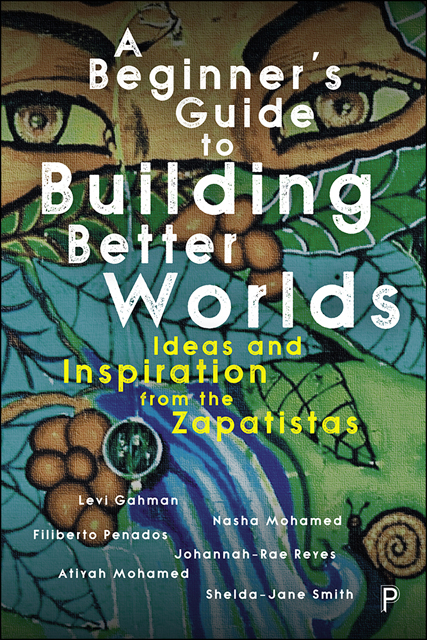Book contents
- Frontmatter
- Dedication
- Contents
- List of figures
- Guilty parties
- 1 Introduction: from liberal bystanding to emancipatory praxis
- 2 A world where many worlds fit
- 3 The coloniser’s model/neoliberal state of the world
- 4 Modernity-coloniality and Indigenous realities
- 5 Dispossession, extractivism and violence
- 6 Critical consciousness and praxis
- 7 Political education and radical pedagogy
- 8 Gender justice and social reproduction
- 9 Health, food sovereignty, solidarity economies
- 10 A battle for the soul of education
- Notes
- References
- Index
9 - Health, food sovereignty, solidarity economies
Published online by Cambridge University Press: 13 October 2022
- Frontmatter
- Dedication
- Contents
- List of figures
- Guilty parties
- 1 Introduction: from liberal bystanding to emancipatory praxis
- 2 A world where many worlds fit
- 3 The coloniser’s model/neoliberal state of the world
- 4 Modernity-coloniality and Indigenous realities
- 5 Dispossession, extractivism and violence
- 6 Critical consciousness and praxis
- 7 Political education and radical pedagogy
- 8 Gender justice and social reproduction
- 9 Health, food sovereignty, solidarity economies
- 10 A battle for the soul of education
- Notes
- References
- Index
Summary
Another world is not only possible, She is on her way. On a quiet day, I can hear her breathing.
Arundhati RoyAnd it is clear that in the colonial countries the peasants alone are revolutionary, for they have nothing to lose and everything to gain.
Frantz FanonWe need not turn any further than the words of Arundhati Roy (2003) and Frantz Fanon (1963) to gain insight into what most threatens life and dignity on this planet, as well as where the ground is most fertile for decolonisation and widespread transformative change. Whether it be mutually recognising the inherent worth of others, decentralising governance, fostering communities of care, co-creating cultures of dissent, actualising emancipatory politics, decommoditising nature, degrowing the economy, effecting food sovereignty or securing material and psychological wellbeing for all, both Roy (2003) and Fanon (1963) rightfully suggest that we just might have something to learn from peasants in identifying what lies at the roots of structural social problems and global inequalities, as well as how to wisely confront and solve them.
As detailed earlier in the book, one of the greatest threats the world currently faces is neoliberalism. As a refresher, the logic of neoliberalism, which endorses responsibilising (blaming) people for the structural conditions they face, entrepreneurial capitalism and free trade agreements that are, paradoxically, heavily regulated by state officials with corporate conflicts of interest, is made manifest through economic policies that promote privatisation, deregulation and cuts to public spending (Mohanty, 2013). Despite rarely being criticised or even mentioned by state officials and mainstream media, neoliberal programmes, practices and rhetoric continue to give rise to unprecedented levels of poverty, anxiety and anguish. This is true not only for the global economy, but also for the global food system and global health.
In light of increased calls to consider neoliberal capitalism as a significant determinant of human and planetary health (Mair, 2020; Sell and Williams, 2020; Flynn, 2021), our focus in this chapter offers an analysis of the entanglements between the social, political and economic factors that shape health and wellbeing. Drawing from examples in EZLN communiqués, as well as on-the-ground food systems and economic practices, we show how the Zapatista struggles offer viable solutions to the devastation caused by global capitalist modernity.
- Type
- Chapter
- Information
- A Beginner’s Guide to Building Better WorldsIdeas and Inspiration from the Zapatistas, pp. 128 - 149Publisher: Bristol University PressPrint publication year: 2022



